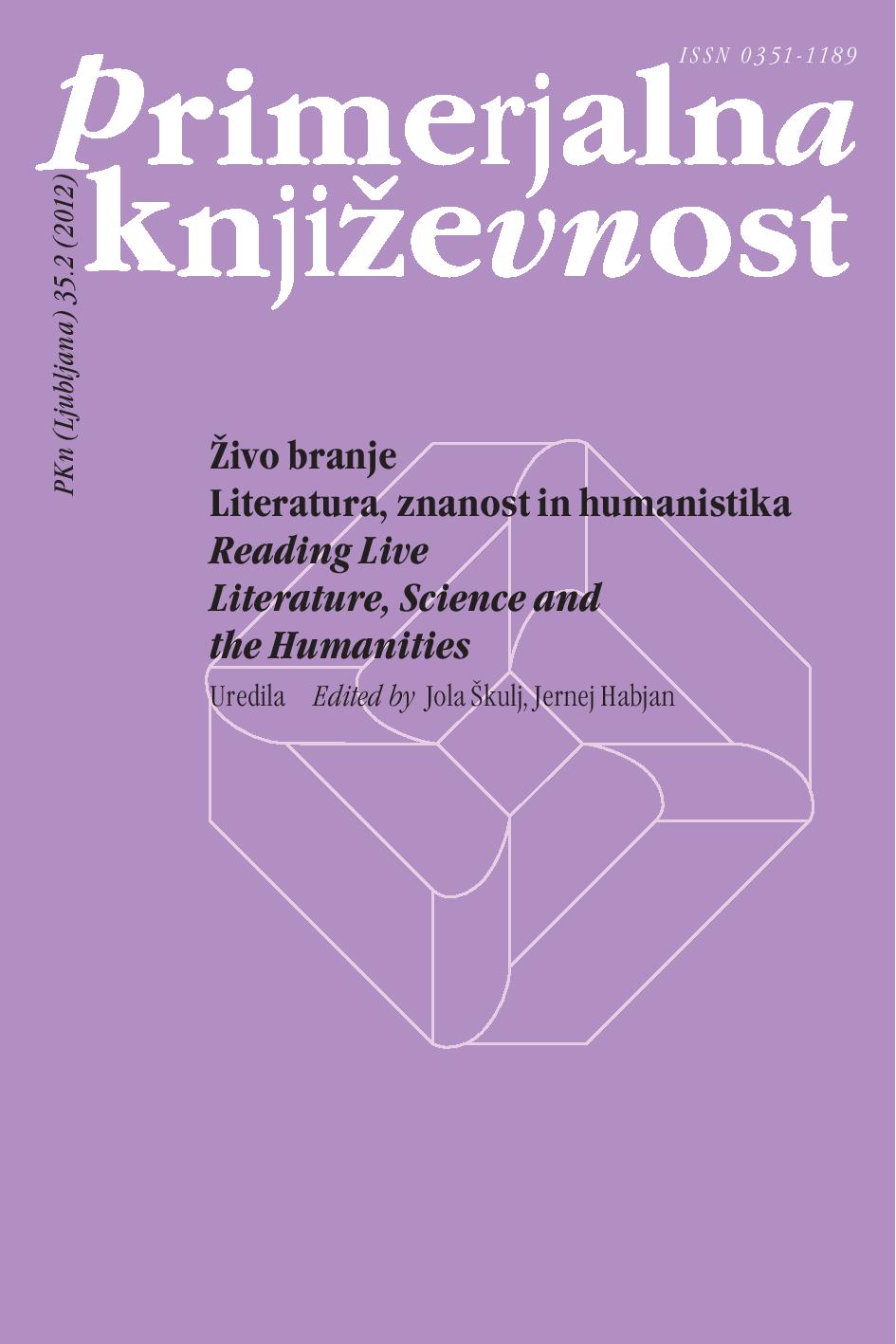Kompleksnost, literatura, znanost: o diskurzu in dialogu
Ključne besede:
literatura, humanistika, znanost, jezik in zavest, modernizem, samoreferenčnost, samorefleksivnost, dialog, Maturana, Humberto R., Heisenberg, Werner, Jakobson, Roman, Lotman, Juri, Thibault, Paul J., Nowotny, HelgaPovzetek
Globlji vpogled v zapleten poetološki sistem modernizma, obdobja, ki se je izgrajevalo v ključnih historičnih prelomih, na novo valoriziralo vlogo jezika in odkrilo ključen pomen gledišča v literaturi ali slikarstvu, pa tudi v znanosti (prim. Heisenberg), pomika vlogo humanistike v novo osvetljavo, tako da ne preseneča, da so jo v ponovnem pretresu znanosti kot enega od petih konkretnih kontekstov za novo produkcijo znanja in za uspešnost znanstvenih politik izpostavljali tudi v epistemoloških predpostavkah (Nowotny idr.). Literatura je vitalen segment žive pojavnosti in branja so neposreden izziv človeške avtopoetske adaptacije in identitetnega prevpraševanja. Razprava se osredotoča na dvoje temeljnih svojstev, na autopoiesis in njen smisel v poiesis, ter na potencial, ki ga imajo besedila v kompleksni življenjski dinamiki.Literatura
Aarseth, Espen. Cybertext. Perspectives on Ergodic Literature. Baltimore in London: Johns Hopkins University Press, 1997.
– – –. »From Humanities Computing to Humanistic Informatics«. Human IT 4 (1997): 7–13.
Beebe, Maurice. »What Modernism Was«. Journal of Modern Literature 3.5 (1973): 1065–1080.
Calinescu, Matei. Faces of Modernity: Avant‑Garde, Decadence, Kitsch. Bloomington: Indiana University Press, 1977.
Frank, Joseph. »Spatial Form in Modern Literature«. Sewanee Review 53 (1945): 221–240, 433–456, 643–653.
Gibbons, Michael, idr. The New Production of Knowledge. The Dynamics of Science and Research in Contemporary Societies. London: Sage, 1994.
Goethe, J. W. von. Faust, Part Two. Prev. Philip Wayne. Hamondsworth: Penguin Classics, 1987.
Heisenberg, Werner. Schritte über Grenzen. Gesammelte Reden und Ausätze. München: R. Piper & Co Verlag, 1973.
Husserl, Edmund: »Die Krisis des Europäischen Menschentums und die Philosophie«. Husserliana. Band VI: Die Krisis der Europäischen Wissenschaften und die transzendentale Phänomenologie. Ur. Walter Biemel. Haag: M. Nijhoff, 1962. 314–348.
– – –. »Philosophy and the Crisis of European Man«. Husserl, Phenomenology and the Crisis of Philosophy. Prev. Quentin Lauer. New York: Harper Torchbooks, 1965. 149–192. Dostopno na: http://www.users.cloud9.net/~bradmcc/husserl_philcris.html (24. 7. 2012).
Invention. Enhancing Inventiveness for Quality of Life, Competitiveness, and Sustainability: Report of the Committee for Study of Invention, Sponsored by the Lemelson-MIT Program and the National Science Foundation. 2004. Dostopno na: http://mit.edu/invent/n-pressreleases/downloads/report.pdf (24. 7. 2012).
Jakobson, Roman. »Closing Statement: Linguistics and Poetics«. Style in Language. Ur. Thomas A. Sebeok. Cambridge (MA): MIT Press, 1960. 350–377.
Le Rider, Jacques. Modernity and Crisis of Identity. Culture and Society in Fin-de-Siècle Vienna. Prev. Rosemary Morris. Oxford: Blackwell, 1993.
Livingston, Ira. Between Science and Literature: An Introduction to Autopoetics. Urbana in Chicago: University of Illinois Press, 2005.
Lotman, Yuri M. Universe of the Mind: A Semiotic Theory of a Culture. London in New York: I.B. Tauris & Co Ltd Publishers, 1990.
Luft, David S. Robert Musil and the Crisis of European Culture, 1880-1942. Berkeley: University of California Press, 1980.
Maturana, Humberto R., in Francisco J. Varela. Autopoiesis and Cognition. The Realization of the Living. Dordrecht, Boston in London: D. Reidel Publishing Company, 1980.
Nowotny, Helga. »The Place of People in Our Knowledge«. European Review 7.2 (1999): 247–262.
– – –. »Transgressive Competence. The Narrative of Expertise«. European Journal of Social Theory 3.1 (2000): 5–21.
Nowotny, Helga, Peter Scott in Michael Gibbons. »‘Mode 2’ Revisited: The New Production of Knowledge«. Minerva 41.3 (2003): 179–194. Dostopno na: http://www.flacso.edu.mx/openseminar/downloads/gibbons.pdf (24. 7. 2012).
– – –. Re-Thinking Science. Knowledge and the Public in an Age of Uncertainty. Cambridge in Malden (MA): Polity, 2006.
Obrist, Hans Ulrich. »Interview with Helga Nowotny«. Tirana Biennale 1: Escape. Milano: Giancarlo Politi Editore, 2001.
Perkins, David. »Mapping the Inventive Mind«. Invention. Enhancing Inventiveness for Quality of Life, Competitiveness, and Sustainability: Report of the Committee for Study of Invention, Sponsored by the Lemelson-MIT Program and the National Science Foundation. 2004. 37–45. Dostopno na: http://mit.edu/invent/n-pressreleases/downloads/report.pdf (24. 7. 2012).
Ricoeur, Paul. »Narrative Identity«. On Paul Ricoeur. Narrative and Interpretation. Ur. David Wood. London: Routledge, 1991. 188–199.
Schafersman, Steven D. »An Introduction to Science. Scientific Thinking and the Scientific Method«. Dostopno na: http://www.geo.sunysb.edu/esp/files/scientific-method.html (24. 7. 2012).
Schwanitz, Dietrich. »Selbstreferentielle Systeme«. Zeitschrift für Literaturwissenschaft und Linguistik 77 (1990): 100–125.
Skulj, Jola. »A Dynamic Authenticity of Texts in E-Archives: On Digitized Cultural Resources in Comparative Literary Studies«. Literatures in the Digital Era: Theory and Praxis. Ur. Amelia Sanz in Dolores Romero. Newcastle: Cambridge Scholars, 2007. 185–200.
– – –. »Landscape and the Spatial in Modernist Representations«. Das Paradigma der Landschaft in Moderne und Postmoderne. Ur. Manfred Schmeling in Monika Schmitz-Emans. Wurzburg: Konigshausen & Neumann, 2007. 63–82.
Snow, C. P. The Two Cultures and the Scientific Revolution. Cambridge: Cambridge University Press, 1959.
Spivak, Gayatri Chakravorty. Death of a Discipline. New York: Columbia University Press, 2003.
Škulj, Jola. »Modernizem in njegove poteze v lirski, narativni in dramski formi«. Primerjalna književnost 21.2 (1998): 45–74.
Thibault, Paul J. Agency and Consciousness in Discourse: Self-Other Dynamics as a Complex System. London in New York: Continuum, 2004.
Turner, Mark. The Literary Mind. Oxford in New York: Oxford University Press, 1996.
– – –. »The Future of the Humanities: Experimenting«. Institution and Interpretation. Ur. Samuel Weber. Stanford (CA): Stanford University Press, 2001. 236–252.


